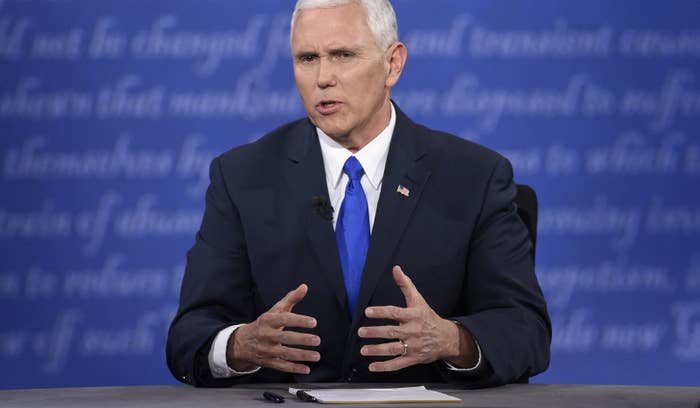
Mike Pence was clear on Tuesday night: Russia is a geopolitical aggressor led by a "small and bullying leader," Vladimir Putin.
That posture isn't unusual in politics — Mitt Romney in 2012 argued Russia was a core threat to the United States. But it is a stark contrast with Pence's own presidential nominee, whose friendly overtures toward Russia and comfort with its growing influence in the Middle East have dominated the foreign policy discussion this year.
Donald Trump has argued that Putin is a stronger leader than Obama, praised his polling numbers in the restrictive political environment of Russia, expressed openness to working with Russia (which supports the regime of Syrian President Bashar al-Assad, and is often allied with Iran) to combat ISIS, and often explained his rationale on personal terms.
"Well, I think when he calls me brilliant, I’ll take the compliment, OK?" Trump recently replied as to why he would accept Putin's support.
Despite all this, Pence was undeterred in his portrait of Russia and some of the key policy confrontations between the US and Russia. On Tuesday night, he affirmed support for missile defense programs in eastern Europe that the Russians have opposed. He emphasized that the United States has a stronger economy than Russia, which he framed as somewhat repressive.
Pence, who voted for the Iraq War and supported the Libya intervention, holds a more hawkish, traditionally Republican worldview than his running mate. "We’ve just got to have American strength on the world stage,” Pence said on Tuesday.
Meanwhile, though Trump has repeatedly promised to knock the hell out of ISIS, his campaign has represented a return to a more realist, and perhaps even isolationist, foreign policy approach. Though he personally supported the Iraq War and Libya intervention, during his campaign, he has repeatedly criticized regime change, foreign interventions, and argued for reassessing major military alliances, and looking to Russia and others for support abroad.
Frequently on the trail, Trump and Pence have seemed to be running entirely different campaigns — ones that aren't quite coordinating messages.
